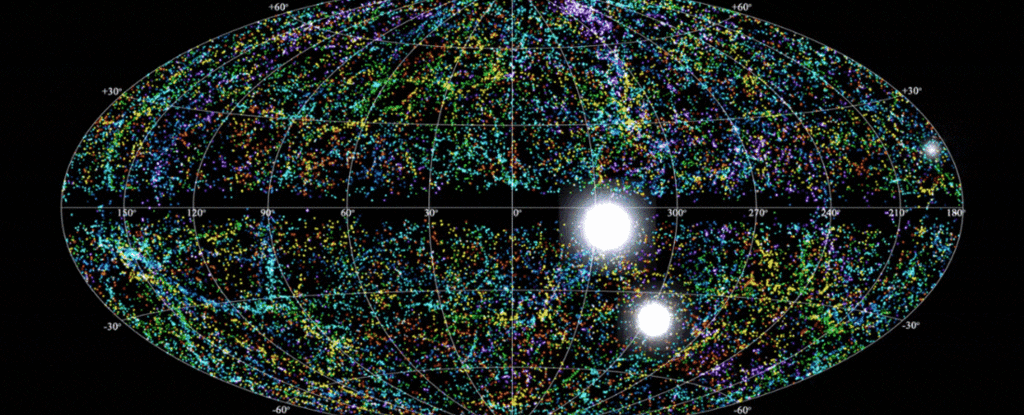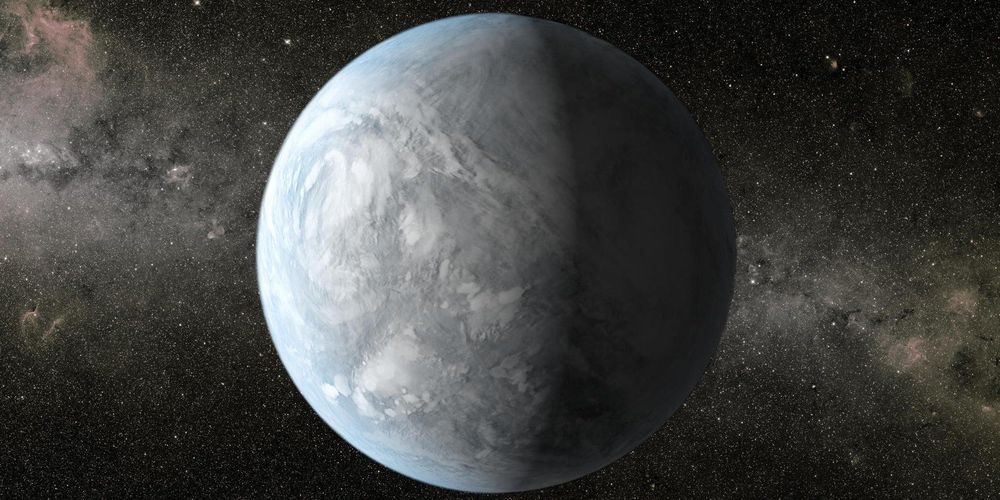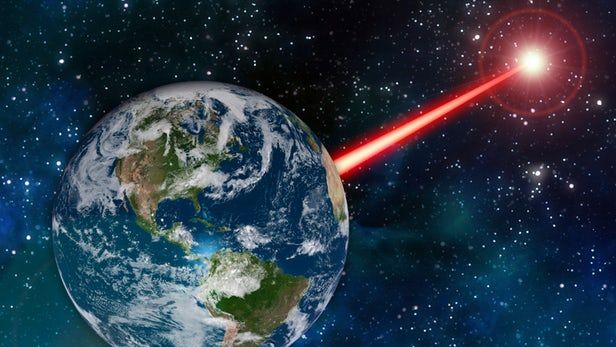This week DARPA kicks off a competition called the Subterranean Challenge, where hordes of robots are unleashed into caves and tunnels to test how well they can autonomously navigate these environments. One team, headed up by NASA’s Jet Propulsion Lab (JPL), is entering a crew of bots that could inform future designs of spacefaring robots that explore caves and lava tubes on other planets and moons.
Category: alien life – Page 133

Astronomers Have Detected a Whopping 8 New Repeating Signals From Deep Space
One of the biggest mysteries out there in the Universe is inching closer to answers. An astonishing eight new repeating radio signals known as fast radio bursts (FRBs) have been detected flaring from deep space.
At the start of 2019, just one of these mysterious signals, FRB 121102, was known to flash repeatedly. In January, scientists reported a second repeating one (FRB 180814).
This new paper — available on preprint server arXiv, and accepted into The Astrophysical Journal Letters — describes eight new repeating signals detected by the Canadian Hydrogen Intensity Mapping Experiment (CHIME) radio telescope.


Embracing the Immaterial Universe
For over four hundred years, Western civilization has chosen science as its source of truths and wisdom about the mysteries of life. Allegorically, we may picture the wisdom of the universe as resembling a large mountain. We scale the mountain as we acquire knowledge. Our drive to reach the top of that mountain is fueled by the notion that with knowledge we may become ‘masters’ of our universe. Conjure the image of the all-knowing guru seated atop the mountain.
Scientists are professional seekers, forging the path up the “mountain of knowledge.” Their search takes them into the uncharted unknowns of the universe. With each scientific discovery, humanity gains a better foothold in scaling the mountain. Ascension is paved one scientific discovery at a time. Along its path, science occasionally encounters a fork in the road. Do they take the left turn or the right? When confronted with this dilemma, the direction chosen by science is determined by the consensus of scientists interpreting the acquired facts, as they are understood at the time.
Along its path, science occasionally encounters a fork in the road.

Nikolai Kardashev, 1932–2019
Russian astrophysicist and SETI pioneer Nikolai Kardashev passed away on August 3, 2019. Known for the Kardashev scale of extraterrestrial civilizations, in 1963 he conducted the first Soviet search for extraterrestrial intelligence (SETI) by examining the quasar CTA-102 for signs of a technological civilization. In the following year, Kardashev organized the first Soviet conference on communication with extraterrestrial intelligence (CETI) at Byurakan Observatory in Armenia. Also in 1964, Kardashev proposed a scale that now bears his name, which is used for classifying extraterrestrial civilizations in terms of their energy use. Civilizations ranked on the Kardashev Scale range from Type I civilizations capable of using the energy resources of a single planet, to Type II civilizations that use the full energy of a star, to Type III civilizations that have access to the energy of an entire galaxy.
In 1971, along with other Soviet astronomers and American Carl Sagan, Kardashev organized a Soviet-American conference on CETI, also held at Byurakan Observatory. Kardashev became a corresponding member of the USSR Academy of Sciences in 1976, and in 1994 he became a full member of the Russian Academy of Sciences. A decade later, he was awarded the Demidov Prize for his work in astrophysics.

NASA’s newest planet-hunting telescope just discovered a ‘super-Earth’ and 2 ‘sub-Neptunes’ less than 75 light-years away — among the closest exoplanets ever found
Three newly discovered worlds are among the smallest and nearest we’ve ever detected.
NASA’s Transiting Exoplanet Survey Satellite, or TESS — a super-powerful orbiting telescope designed to hunt for alien worlds — found the planets orbiting a star just 73 light-years away.
One is a rocky “super-Earth” that’s more massive than our home planet but lighter than giants like Neptune. The other two are icy “sub-Neptunes” that are about half the size of Neptune.

A Blueprint for a Quantum Propulsion Machine
This could be used for real hoverboards and hovering spacecraft could float out of atmosphere just like aliens do :3.
The quantum vacuum has fascinated physicists ever since Hendrik Casimir and Dirk Polder suggested in 1948 that it would exert a force on a pair of narrowly separated conducting plates. Their idea was eventually confirmed when the force was measured in 1997. Just how to exploit this force is still not clear, however.
In recent years, a new way of thinking about the quantum vacuum has emerged which has vastly more potential. And today, one physicist describes how it could be used to create propulsion.
Before we discuss that, let’s track back a little. According to quantum mechanics, any vacuum will be filled with electromagnetic waves leaping in and out of existence. It turns out that these waves can have various measurable effects, such as the Casimir-Polder force.

Biofilms and microbial mineral exploitation in space
The ESA BioRock space experiment was carried into orbit, bound for the International Space Station (ISS), on 25 July 2019 as part of the SpaceX CRS-18 mission. CRS-18 lifted off from Space Launch Complex 40 (SLC-40) at Cape Canaveral Air Force Station, Florida, aboard a Falcon 9 launcher. The experiment will investigate the growth of biofilms and their ability to extract minerals and use them as nutrients (biomining) in microgravity conditions. This will be directly compared with results obtained under Mars and Earth gravity conditions simulated using a centrifuge on the ISS. The findings will contribute towards a better understanding of the growth of microorganisms in space, which is also key to bioregenerative life support systems, the formation of biofilms and microbial ore extraction. In future, such processes could be used in the biomining of economically valuable chemical elements such as copper on other planets. The German Aerospace Center (Deutsches Zentrum für Luft- und Raumfahrt; DLR) is playing a key role in the experiment.
Three species of bacteria are being investigated in the BioRock experiment: Sphingomonas desiccabilis, Bacillus subtilis and Cupriavidus metallidurans. “Our research focuses on the organism Bacillus subtilis,” says Petra Rettberg from the DLR Institute of Aerospace Medicine. “We are curious to see how well this bacterium can extract nutrients from the minerals of the basalt that was inoculated with Bacillus spores for the space experiment.” Over the coming weeks, the experiment will be put into operation on the ISS and is expected to remain in space until the end of August 2019. The experiment will then return to Earth for analysis and evaluation, with the samples later being examined in the astrobiological laboratories at the DLR site in Cologne.
Biofilms are among the oldest visible signs of life on Earth and could also perhaps be found to be the earliest forms of life on other planets and moons in the Solar System. A biofilm is a structured community of microorganisms on a surface, encapsulated in a self-formed matrix made of extracellular polymeric substances (EPS). This EPS matrix holds the microorganisms together in their three-dimensional arrangement and enables the biofilm to adhere to surfaces. The properties of microorganisms living within a biofilm generally differ substantially from those of microorganisms of the same species existing independently. The dense environment of the film allows them to cooperate with one another, interact in many ways and protects these minute organisms from external influences. This means that microorganisms in biofilms are highly resistant to various chemical and physical effects and can be used for a range of applications in space.
The Philippines as seen from space
Have you ever wondered why Sulu is as bright as Metro Manila? Is there a mega city brightly lit at night in Sulu? None. Then are these alien space crafts?
Or could they be a thousand purse seiners operating in Sulu waters just near the poorest province called Sulu yet grossing at least 10 billion worth of sardines a month with not a single centavo of tax to Sulu nor ARMM since they all are operating in Zamboanga City. Note purse seiners are fishing boats with lights that can light up a stadium per boat to attract fish. A single set of purseiner can catch a million worth of fish a day. Multiply by hundreds and at least 3 to 5 billion a month will be easy. The lights shows at least several hundred to five hundred boats to light up the size if Manila and even bigger than well lighted Zamboanga City streets thats 50kms.
The major lights in the map symbolizes power, wealth and influence as you can see in metro manila, cebu and davao. However, pls do not be misled by this satellite image showing sulu as if glowing in the dark. Its the sardines industry capital of the Philippines operation.

Powerful new telescope joins the search for possible laser pulses from aliens
Statistically, it’s pretty much a given that alien life is out there somewhere, whether that’s Martian microbes or highly intelligent life beaming comms through the cosmos. While the Curiosity rover is poking around in the dirt for the former, the Breakthrough Listen initiative is searching for the latter. Now, a new telescope array has joined the hunt, scanning the skies for flashes of laser light that alien civilizations might be giving off.
 Along its path, science occasionally encounters a fork in the road.
Along its path, science occasionally encounters a fork in the road.